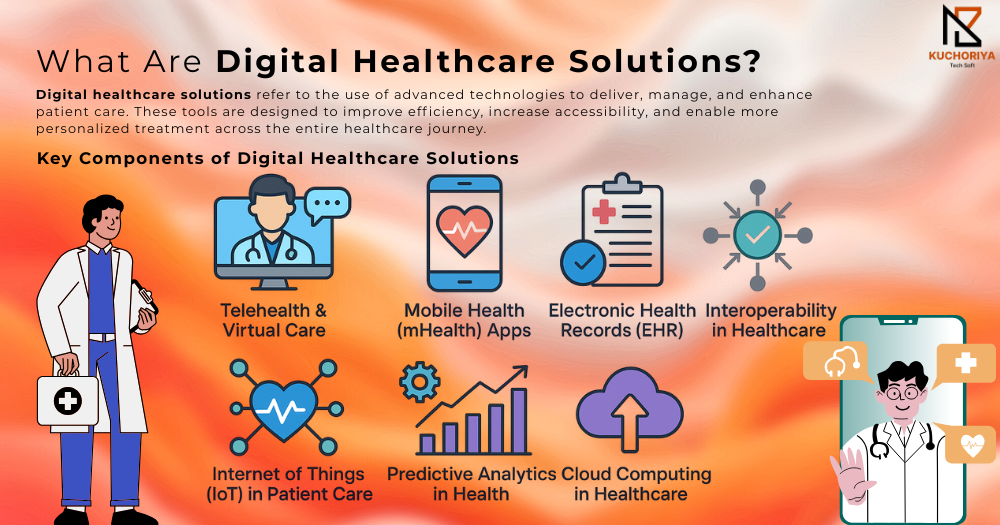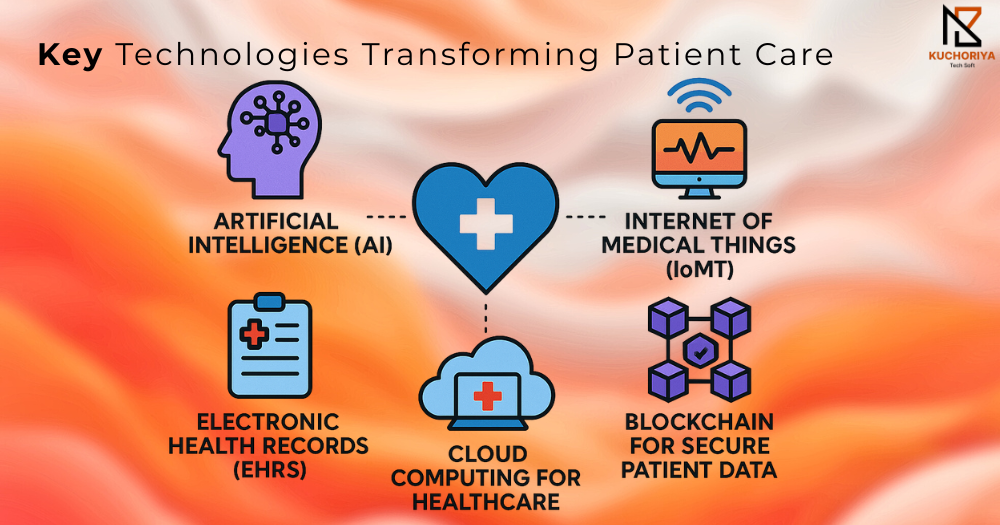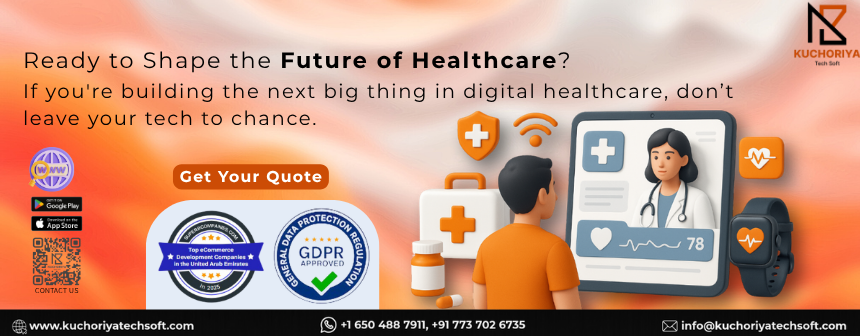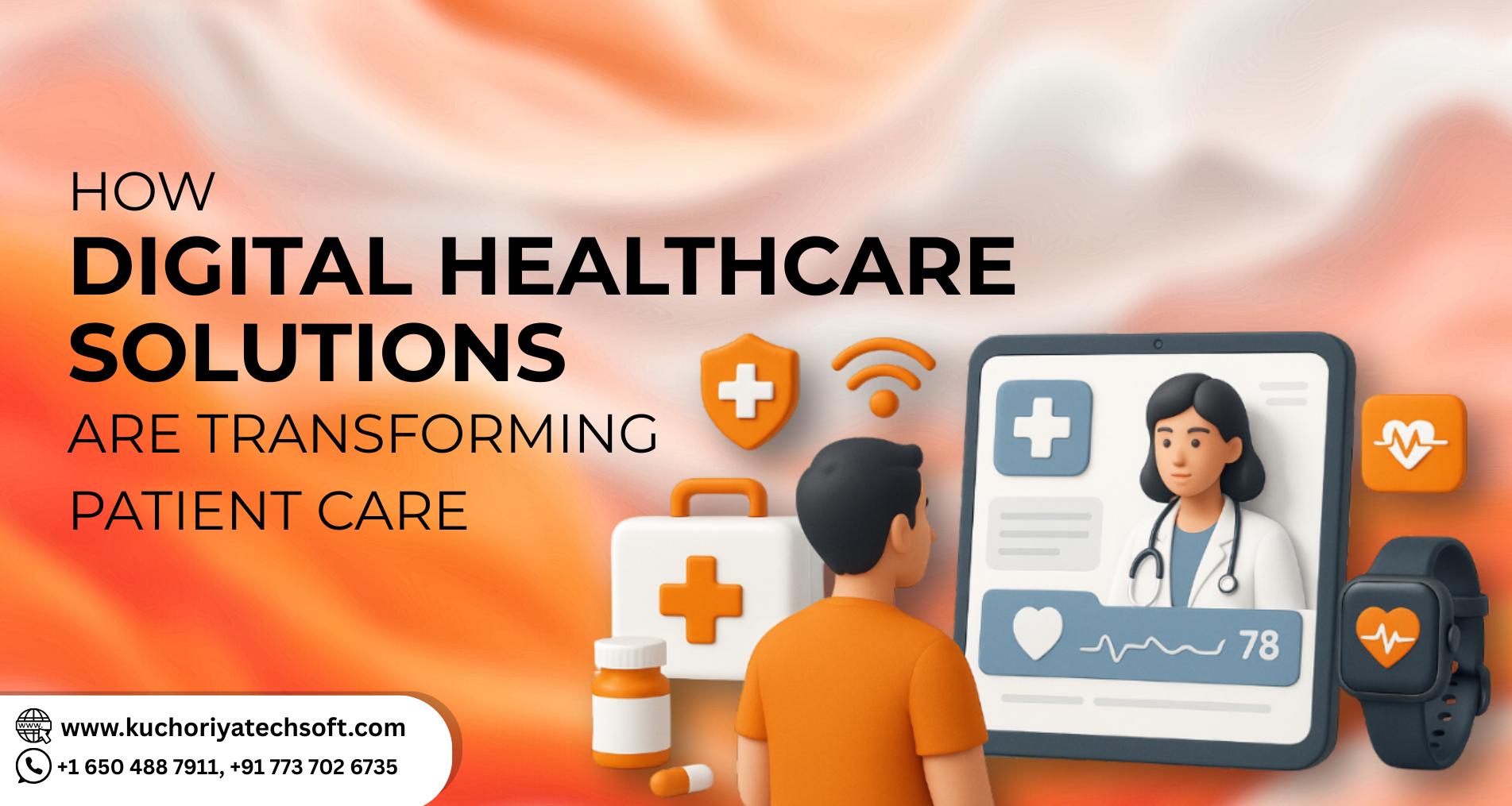How Digital Healthcare Solutions Are Transforming Patient Care in 2025
By 2025, digital health technologies are expected to serve over 70% of global patients through virtual and remote channels. The healthcare industry is rapidly evolving, and digital healthcare solutions are at the heart of this transformation. With the rise of eHealth, AI-powered diagnostics, and remote patient care technology, this year marks a major shift toward smarter, faster, and more personalized care.
This white paper explores how digital health technologies are transforming patient care and enabling more efficient, and connected healthcare systems. At Kuchoriya TechSoft, we empower healthcare providers and startups with innovative digital healthcare tools tailored to meet the demands of today’s tech-enabled world.
The global healthcare landscape is undergoing a powerful shift toward smarter, and more personalized care. Innovations like AI in healthcare, virtual care delivery, and real-time data insights are accelerating the pace of patient care transformation.
This shift is redefining how healthcare is delivered, moving from reactive treatment to proactive, personalized patient care powered by smart healthcare systems. What once seemed futuristic is now becoming essential.
In this white paper, we explore how healthcare innovation in 2025 is setting new standards for quality, accessibility, and efficiency, and how Kuchoriya TechSoft are helping lead this digital transformation.
While digital tools are transforming many industries, traditional healthcare delivery still faces major challenges that impact both providers and patients. Here's a closer look at the current landscape:
Challenges in Traditional Patient Care
- Overdependence on manual, paper-based systems
- Limited follow-ups and fragmented care coordination
- Slow response times due to outdated workflows
- Inability to scale services during patient surges
Gaps in Accessibility, Efficiency & Personalization
- Rural and remote patients lack access to specialists
- One-size-fits-all treatment approaches still dominate
- Limited use of real-time data to guide decisions
- Inefficient scheduling and patient management systems
Post-Pandemic Shifts in Healthcare Systems
- Rise in telemedicine adoption and virtual care platforms
- Surge in remote patient monitoring for chronic conditions
- Growing need for healthcare IT consulting to modernize systems
- Increased investment in medical software development and healthcare digital infrastructure
- Shift toward value-based digital care models focused on outcomes, not volume
The current system is evolving, but for many organizations, the transformation is still in progress. Moving forward requires not just adopting digital tools but rethinking the entire delivery model to ensure long-term sustainability and improved patient outcomes.

Digital healthcare solutions refer to the use of advanced technologies to deliver, manage, and enhance patient care. These tools are designed to improve efficiency, increase accessibility, and enable more personalized treatment across the entire healthcare journey.
Digital health goes far beyond virtual appointments. It’s about building smarter, more connected systems that use real-time data to improve outcomes.
Key Components of Digital Healthcare Solutions
- Telehealth & Virtual Care: Offers remote consultations and care delivery, making healthcare more accessible, especially in rural areas.
- Mobile Health (mHealth) Apps: Empower patients to track their health, schedule appointments, access prescriptions, and communicate with providers on the go.
- Electronic Health Records (EHR): Centralized digital records that ensure better coordination and accuracy in patient data sharing.
- Internet of Things (IoT) in Patient Care: Wearables and smart devices that monitor vitals, detect abnormalities, and support chronic disease management in real time.
- Predictive Analytics in Health: Uses data to forecast patient needs, prevent complications, and optimize treatment plans.
- Cloud Computing in Healthcare: Enables secure, scalable storage and access to health data across devices and platforms.
- Interoperability in Healthcare: Ensures different systems and tools can share data seamlessly, creating a unified and efficient care ecosystem.
As digital transformation accelerates across the healthcare industry, 2025 is shaping up to be a landmark year for innovation. New technologies are not only reshaping how care is delivered but also redefining the roles of providers, patients, and digital platforms. Below are the most impactful trends driving the future of healthcare.
- AI and Machine Learning in Diagnostics: AI is enhancing diagnostic accuracy by analyzing large sets of patient data faster and more precisely than ever before. These tools support health informatics and reduce diagnostic errors, improving early detection of diseases like cancer, heart conditions, and neurological disorders.
- Remote Patient Monitoring (RPM): Real-time health monitoring devices allow doctors to track patients’ vitals from afar, enabling proactive treatment and reducing hospital readmissions. RPM is becoming a core feature in chronic care and post-surgical recovery.
- Wearable Health Devices & IoT: Smartwatches, fitness trackers, and implantable sensors are part of a growing IoT-enabled patient care ecosystem. These tools deliver constant updates, supporting continuous care and better care coordination platforms.
- Virtual Care and Telemedicine Adoption: Virtual consultations are now mainstream. Hospitals and clinics are investing in health IT infrastructure to scale telehealth services and deliver personalized care from any location, improving access and reducing wait times.
- Predictive Analytics for Patient Outcomes: Using AI-driven insights, providers can now anticipate complications before they happen. Predictive analytics helps improve treatment plans, reduce emergency visits, and streamline operations within hospitals.
- Digital Twin Technology in Healthcare: Digital twins, virtual replicas of patients or organs, are revolutionizing medical research and treatment planning. This emerging tool is gaining traction among healthtech startups and leading hospital innovation initiatives.
- Focus on Health Data Security: As data becomes the backbone of care delivery, health data security is critical. Organizations are strengthening their cybersecurity practices to protect patient information and ensure regulatory compliance.
- Healthcare Digital Transformation as a Whole: From cloud-based EHRs to AI-enabled diagnostics, the entire industry is moving toward full-scale healthcare digital transformation, powered by scalable platforms and next-gen technologies.
These trends are not just shaping the future, they’re becoming the standard. At the core of it all is the goal of delivering more efficient, secure, and patient-centered care through innovation.
The rise of digital tools in healthcare is delivering clear, measurable benefits for both patients and providers. From increasing access to care to enabling smarter, more personalized treatment, digital healthcare is shaping the future of patient care.
- Improved Access to Care: With virtual consultations, mobile apps, and online portals, patients now receive timely care regardless of location. This expansion of access is a direct result of digital transformation in healthcare, making services more inclusive and scalable.
- Personalized and Preventive Treatment: Next-gen healthcare solutions like AI-driven diagnostics and predictive analytics enable care that is tailored to individual needs. Providers can now detect risks early, improving prevention and long-term outcomes.
- Real-Time Monitoring and Early Diagnosis: Healthcare automation technologies such as wearable devices and remote sensors offer real-time monitoring, giving clinicians the ability to act quickly and prevent complications. This is especially valuable for managing chronic conditions.
- Enhanced Patient Engagement and Satisfaction: Modern patient engagement platforms empower individuals to take an active role in their health through education, reminders, and seamless communication. As a result, satisfaction rates and treatment adherence both improve.
- Reduced Costs and Hospital Readmissions: By minimizing in-person visits, avoiding unnecessary tests, and enabling home-based care, digital health reduces the overall burden on healthcare systems. These cost savings are a major driver behind rising digital health investments.
- Data Privacy and Compliance: All digital systems are being built with regulatory compliance in mind, including HIPAA, GDPR, and other regional regulations, ensuring patient data remains safe and secure.

In 2025, technology is not just supporting healthcare, it’s fundamentally transforming it. Smart digital healthcare platforms are driving a new era of innovation in patient care.
- Artificial Intelligence (AI): AI-powered healthcare platforms are enhancing diagnostics, automating workflows, and predicting patient outcomes with impressive accuracy. These healthcare AI tools support faster decisions and enable clinicians to focus on complex, human-centric care.
- Internet of Medical Things (IoMT): Connected devices, from glucose monitors to smart wearables, are enabling technology-driven patient care through real-time health data. This intelligent healthcare system promotes proactive treatment and better disease management.
- Electronic Health Records (EHRs): Modern digital solutions for healthcare providers rely on advanced EHR systems for centralized, real-time patient information. EHRs improve care coordination, reduce duplication, and increase accuracy across the board.
- Blockchain for Secure Patient Data: Security is a growing concern, and blockchain offers a decentralized, tamper-proof way to manage patient records. It ensures trust, transparency, and compliance across smart digital healthcare platforms.
- Cloud Computing for Healthcare: Cloud infrastructure allows providers to access, store, and analyze vast amounts of health data on demand. It’s a backbone for intelligent healthcare systems, supporting scalability and collaboration across hospitals and clinics.
Digital innovation in medical services is expected to redefine how care is delivered, accessed, and experienced globally.
- Predictive Care Models: AI and big data will help forecast health risks before symptoms even appear, ushering in a new era of digital wellness solutions and preventive care.
- AI-Powered Decision-Making: From diagnosis to treatment planning, chatbots for healthcare and intelligent algorithms will support doctors in making faster, data-backed decisions.
- Fully Virtual Hospitals: With cloud-based healthcare solutions and advanced telemedicine, fully remote healthcare ecosystems will become the norm, delivering care without physical walls.
- Global Healthcare Platforms: Cross-border platforms will offer unified patient records, powered by healthcare operations automation and seamless digital healthcare consulting solutions.
The future promises more personalized, connected, and proactive healthcare, where technology doesn’t just support care, it leads it.
As we've explored, the integration of health technology, digital healthcare services, and AI-driven platforms is reshaping the future of healthcare, making care more connected, preventive, and patient-centric.
From healthcare apps that monitor vitals in real-time to scalable digital solutions for healthcare providers, the landscape is evolving at an unprecedented pace. This transformation enhances patient safety in healthcare, streamlines clinical workflows, and empowers decision-makers with actionable insights.
Now is the time for healthcare providers, startups, and policymakers to align with future-ready healthcare strategies. Investing in the right digital transformation solutions for healthcare ensures long-term impact and sustainable patient outcomes.
Ready to Shape the Future of Healthcare? If you're building the next big thing in digital healthcare, don’t leave your tech to chance. Contact us today

Visit our website at kuchoriyatechsoft.com Or email us at info@kuchoriyatechsoft.com
HIRE A TOP SOFTWARE DEVELOPMENT COMPANY
We are all over the world
United State
9765 keystone court, Clarence, NY 14031 , USA, +1 (650) 488-7911
Canada
1100 Caven St., Suite PH11, Mississauga, ON L5G 4N3 Canada , +1 (416) 726-4662, +1 (650) 488-7911
Brazil
Bispo César da Corso Filho, 1266, San Carlos, São Paulo, Boa Vista, Brazil, 13575-331
South Africa
12 IbisWay, Sunnydale Fish Hoek 7985 Western Cape, South Africa, +27824507091
Spain
The Fir Tree 119 El Olmillo Residential Area Loranca de Tajuña 19141 Guadalajara, Spain
UAE
Building A2 DDP - Dubai Silicon Oasis - Dubai - United Arab Emirates
Italy
Viale dell'Esperanto, 71, Formia, Italy, Lazio IT
Singapore
01-08 50 Ubi Cres, Ubi TechPark, Singapore, 408568
Hong Kong
Tower 2, Silvercord, Rm 907, 9F, 30 Canton Rd, Tsim Sha Tsui, Hong Kong
Australia
Unit 14G, 3 darling point road, darling point, Sydney, NSW, Australia, 2027
India
C-15, 1st floor, Mahalaxmi Marg, Behind World Trade Park, Malviya Nagar, Jaipur, Rajasthan - 302017























